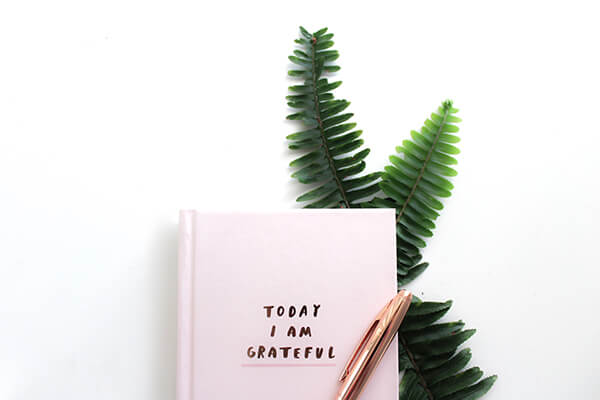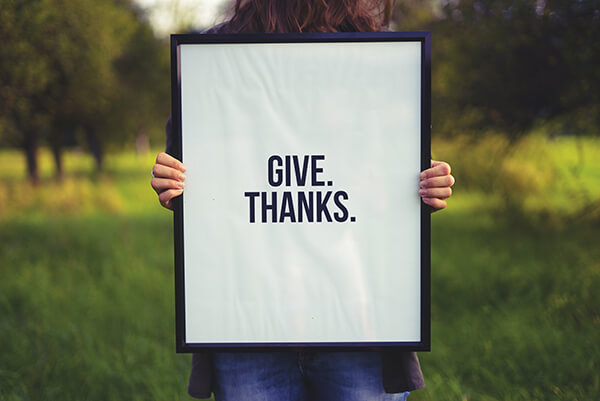There has been a lot written lately that references this 2016 study by Kini et al. about how gratitude actually changes the brain.
This study is incredible because it confirms something that many of us have experienced first hand:
The study's findings suggest that there is a part of the brain that is enhanced through gratitude practices. These practices strengthen parts of the brain, which cause you to feel more generally grateful in a way that impacts your perceptions throughout your daily life.
Here are four ways to practice gratitude and strengthen your brain's gratitude muscle, so to speak.
1. Expressing Gratitude for Living Another Day
I learned recently that in many Indigenous cultures, a customary morning time greeting can be roughly translated to, "You survived the night." This is something valuable to consider.
We are not promised another day when we lay ourselves to rest and allow ourselves to sleep.
We slip into another astral dimension. For these cultures they were also exposed to violence and other threats to their existence, as many humans continue to be today, coming back to live another day can be viewed as a divine gift.
You can say a thankful prayer to Spirit, to your body, to the universe, or simply take a moment to be grateful for a new day upon awakening.
This is something you could do before bed as well, reflecting on the day and expressing gratitude for the gift you have received.
Read: Expansion Through Appreciation

2. Gratitude Journalling
This is essentially the tool that what was used in the study mentioned in the beginning of this article. The participants wrote gratitude letters and it significantly impacted their brains in ways that showed up on an fMRI.
We can rewire our brain through conscious, intentional, and desirable repetitive actions.
Writing is a valuable tool rather than simply reciting words, as it is believed to created more lasting neurological effects. Only thinking or speaking is effective as well, just not as much as putting pen to paper.
Writing something down creates a mind-body connection, which more easily links both hemispheres of the brain.
It is also believed that this activity is more effective as a daily practice if one specific thing that you are grateful for is explored in depth, rather than simple listing several different things that you are grateful for.
This is another great ritual for your morning routine, as it sets a thankful tone for your day.
It is great to do for before bed as well, as it plants seeds of gratitude into your subconscious mind as you slip into sleep.
Read: How to Choose Love Over Fear With Each Thought
3. Focus on What You Have Rather Than What You do not Have
When I think about this principle, I am reminded of lyrics in Sheryl Crow's song titled, "Soak Up The Sun." She sings,
"It's not having what you want, it's wanting what you got."
What you bring your attention to will consistently impact your thought patterns. If you focus on areas you lack, your mind will naturally build upon those thoughts from the lens of scarcity.
If you focus on what you already have and appreciating it, your mind will build from there instead.
If you notice your mind drifting towards a scarcity mentality of whats lacking, refocus it to the abundance of what is already present in your life in order to attract more of those things.
Pay attention to what you already have in regards to your health (spiritual, mental, emotional, and physical), any basic needs that are already met (shelter, food, security, and love), your existing relationships, family members, and pets.
Bringing our awareness to what we have and being thankful for those things can go a long way in training your mind to continue to recognize what we have rather than what we do not have.
Read: Focus On What You Want Versus What You Don't Want

4. Practice Expressing Your Gratitude
Make a habit of telling people you appreciate them.
Thank strangers for small gestures like holding the door open for you.
Send a text to an old friend when you think of a memory that makes you smile.
You may find that the more often you take time to stop and express your gratitude, even when they are small fleeting moments, then the more often you will notice things to be grateful for.
As a result, you will experience feelings of gratitude more often.
Read: Expansion Through Appreciation
Practice Gratitude Like Your Life Depends On It
Happiness comes from within. The brain produces our sense of happiness. It does not come from external stimulus.
This is not to say that certain external things may help you to be happy, but we must recognize that happiness comes from the meaning we attach to those things.
It is always in our control to shift your mindset to create new meaning. We have the science to back up these claims.
There is power in affirmations, meditation, optimism, and positivity.
This does not mean we choose to be positive by repressing so called "negative" emotions.
Instead, we allow ourselves to feel whatever arises, with gratitude. Often, this is by no means an easy task.
I want to take this opportunity as mental health professional to acknowledge that it is dangerous to approach mental wellness with the belief that positivity or gratitude can "cure" mental health challenges, like depression.
Yet, there are studies including this 2017 study by Fuschia & Wood that support drafts similar to this. The study shows gratitude as tool for lowering depression among populations who are chronically ill with a physical illness.
This is important because it supports my earlier statement that while we may not be able to change our external circumstances, like having a chronic physical illness, we can change the meaning that we create about it.
We can do this through gratitude practices.
We are gifted this life and that in itself is something to be incredibly grateful for.
During These Times of Stress and Uncertainty Your Doshas May Be Unbalanced.
To help you bring attention to your doshas and to identify what your predominant dosha is, we created the following quiz.
Try not to stress over every question, but simply answer based off your intuition. After all, you know yourself better than anyone else.